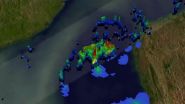(Press-News.org) PHILADELPHIA —Women who took clomiphene citrate (brand name Clomid) or gonadotropins as a part of fertility treatment did not experience an increased risk for breast cancer over 30 years of follow-up, compared with women who were not treated with these medications, according to a study published in Cancer Epidemiology, Biomarkers & Prevention, a journal of the American Association for Cancer Research.
"We wanted to evaluate the long-term relationship of fertility medications and breast cancer risk after controlling for other factors that have been shown to be correlated with both breast cancer risk and use of those drugs," said Louise A. Brinton, Ph.D., M.P.H., chief of the Hormonal and Reproductive Epidemiology Branch at the National Cancer Institute (NCI) in Bethesda, Md. "Overall, our data show that use of fertility drugs does not increase breast cancer risk in this population of women, which is reassuring."
An elevated risk for invasive breast cancer was observed for a small number of women who were exposed to 12 or more cycles of clomiphene, who had a little more than 1.5 times the risk of women in the study who never took fertility drugs. Women who were unable to become pregnant after taking gonadotropins and clomiphene citrate had nearly twice the risk of women in the study who never took either medication.
"The observed increase in risk for these small subsets of women may be related to persistent infertility rather than an effect of the medications," said Brinton. "Nevertheless, these findings stress the importance of continued monitoring of women who are exposed to fertility drugs."
Under current practices, clomiphene is usually limited to three to six cycles at doses up to 100 mg, which is far lower than in the past, including patients in this study who were prescribed doses up to 250 mg, oftentimes for many years, explained Brinton.
"Given the high doses of drugs received by our study participants and the lack of large increases in breast cancer risk many years after exposure, women previously exposed to such drugs should be reassured by these findings," said Brinton. "However, the women in our study who developed breast cancer were on average only 53 years old, which is still young in terms of when we usually expect breast cancers to develop.
"This cohort of women should continue to be monitored as they progress into a typical breast cancer age range; in addition, data are needed to assess the long-term effects of fertility drugs given in current practice, such as those used in conjunction with IVF," added Brinton.
This study was conducted using data from a cohort of more than 12,000 women evaluated for infertility between 1965 and 1988 at five different locations in the United States that retained detailed records of infertility evaluations and treatments. These patients were followed until 2010, and 9,892 were eligible for this study. Among them, 749 women developed breast cancer. The researchers were able to obtain medical documentation for 696 of these, and 536 were validated as having invasive breast cancers.
INFORMATION:
This study was funded by the NCI. Brinton declares no conflicts of interest.
Follow the AACR on Twitter: @AACR
Follow the AACR on Facebook: http://www.facebook.com/aacr.org
About the American Association for Cancer Research
Founded in 1907, the American Association for Cancer Research (AACR) is the world's oldest and largest professional organization dedicated to advancing cancer research and its mission to prevent and cure cancer. AACR membership includes more than 34,000 laboratory, translational, and clinical researchers; population scientists; other health care professionals; and cancer advocates residing in more than 90 countries. The AACR marshals the full spectrum of expertise of the cancer community to accelerate progress in the prevention, biology, diagnosis, and treatment of cancer by annually convening more than 20 conferences and educational workshops, the largest of which is the AACR Annual Meeting with more than 18,000 attendees. In addition, the AACR publishes eight peer-reviewed scientific journals and a magazine for cancer survivors, patients, and their caregivers. The AACR funds meritorious research directly as well as in cooperation with numerous cancer organizations. As the Scientific Partner of Stand Up To Cancer, the AACR provides expert peer review, grants administration, and scientific oversight of team science and individual grants in cancer research that have the potential for near-term patient benefit. The AACR actively communicates with legislators and policymakers about the value of cancer research and related biomedical science in saving lives from cancer. For more information about the AACR, visit http://www.AACR.org.
Study shows fertility drugs do not increase breast cancer risk
2014-04-03
ELSE PRESS RELEASES FROM THIS DATE:
Transplant drugs may help wipe out persistent HIV infections
2014-04-03
New research suggests that drugs commonly used to prevent organ rejection after transplantation may also be helpful for combating HIV. The findings, which are published in the American Journal of Transplantation, suggest a new strategy in the fight against HIV and AIDS.
Despite the effectiveness of antiviral therapies at suppressing HIV, the virus still persists indefinitely at low levels in infected patients who are diligent about taking their medications. "Current therapies fail to cure the disease as they do not attack those viruses that remain hidden within the immune ...
Stroke risk higher after shingles, but antiviral drugs may provide protection
2014-04-03
[EMBARGOED UNTIL THURSDAY, APRIL 3] Patients' risk of stroke significantly increased following the first signs of shingles, but antiviral drugs appeared to offer some protection, according to a new study in Clinical Infectious Diseases, now available online. People with shingles, an often painful skin rash caused by the same virus that causes chickenpox, had a higher stroke risk in the first 6 months after shingles symptoms appeared; this risk was particularly increased in patients with a rash near their eyes, the study found.
Shingles, or herpes zoster, is a significant ...
A brain region for resisting alcohol's allure
2014-04-03
As recovering spring breakers are regretting binge drinking escapades, it may be hard for them to appreciate that there is a positive side to the nausea, sleepiness, and stumbling. University of Utah neuroscientists report that when a region of the brain called the lateral habenula is chronically inactivated in rats, they repeatedly drink to excess and are less able to learn from the experience. The study, published online in PLOS ONE on April 2, has implications for understanding behaviors that drive alcohol addiction.
While complex societal pressures contribute to alcoholism, ...
Magnetic anomaly deep within Earth's crust reveals Africa in North America
2014-04-02
Boulder, Colo., USA – The repeated cycles of plate tectonics that have led to collision and assembly of large supercontinents and their breakup and formation of new ocean basins have produced continents that are collages of bits and pieces of other continents. Figuring out the origin and make-up of continental crust formed and modified by these tectonic events is a vital to understanding Earth's geology and is important for many applied fields, such as oil, gas, and gold exploration.
In many cases, the rocks involved in these collision and pull-apart episodes are still ...
NASA releases images of M-class solar flare
2014-04-02
On April 2, 2014, the sun emitted a mid-level solar flare, peaking at 10:05 a.m. EDT, and NASA's Solar Dynamics Observatory captured imagery of the event. Solar flares are powerful bursts of radiation. Harmful radiation from a flare cannot pass through Earth's atmosphere to physically affect humans on the ground, however -- when intense enough -- they can disturb the atmosphere in the layer where GPS and communications signals travel.
To see how this event may impact Earth, please visit NOAA's Space Weather Prediction Center at http://spaceweather.gov, the U.S. government's ...
NASA sees Tropical Cyclone's Hellen's lively remnants
2014-04-02
Powerful Tropical Cyclone Hellen rapidly weakened after hitting northwestern Madagascar but Hellen's remnants have recently started to show signs of life. The TRMM satellite flew over these remnants in the Mozambique Channel on April 2, 2014 at 0143 UTC.
A rainfall analysis using the Tropical Rainfall Measuring Mission's (TRMM) Microwave Imager (TMI) and Precipitation Radar (PR) instruments found that some strong convective thunderstorms had developed in the area. It was revealed by TRMM PR data that rain was falling at a rate of over 75 mm/~ 3 inches in a few locations.
TRMM's ...
River ice reveals new twist on Arctic melt
2014-04-02
A new study led by Lance Lesack, a Simon Fraser University geographer and Faculty of Environment professor, has discovered unexpected climate-driven changes in the mighty Mackenzie River's ice breakup. This discovery may help resolve the complex puzzle underlying why Arctic ice is disappearing more rapidly than expected.
Lesack is the lead author on Local spring warming drives earlier river-ice breakup in a large Arctic delta. Published recently in Geophysical Research Letters, the study has co-authors at Wilfrid Laurier University, the University of Alberta and Memorial ...
Body odor changes following vaccination
2014-04-02
PHILADELPHIA (April 2, 2014) – Our understanding of the role of body odor in conveying personal information continues to grow. New research from the Monell Chemical Senses Center and the U.S. Department of Agriculture (USDA) reveals that immunization can trigger a distinct change in body odor. This is the first demonstration of a bodily odor change due to immune activation.
The findings will appear in the April 10 issue of Physiology and Behavior. In addition, portions of the work will be presented on April 10 at the 36th Annual Meeting of the Association for Chemoreception ...
Science-themed music videos boost scientific literacy, study shows
2014-04-02
As the United States puts ever-greater emphasis on science, technology, engineering and mathematics education to keep competitive in the global economy, schools are trying to figure out how to improve student learning in science.
University of Washington researchers Katie Davis and Greg Crowther think music may be the answer for some kids. They studied the ability of music videos to enhance students' understanding of scientific concepts.
Davis will present "Sing about Science: Leveraging the Power of Music to Improve Science Education" on Friday (April 4) at the American ...
Gauging the impact of tropical forest logging: Winrock develops new method for quantifying carbon emissions
2014-04-02
ARLINGTON, Va. (April 2, 2014) — Researchers at Winrock International have developed a first-of-its-kind method for estimating carbon emissions from forest degradation caused by selective logging in tropical regions. Refined over a period of 15 years and tested in six countries, the approach is highlighted in an article authored by Winrock's Ecosystems Services experts, Timothy Pearson, Sandra Brown and Felipe Casarim — published April 1 in Environmental Research Letters.
Until now, efforts for reducing emissions from deforestation and forest degradation (REDD+) in developing ...



